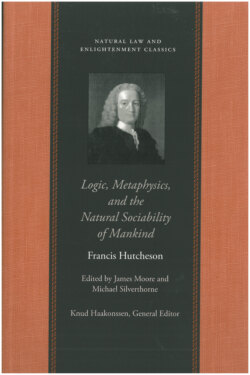Читать книгу Logic, Metaphysics, and the Natural Sociability of Mankind - Francis Hutcheson - Страница 12
На сайте Литреса книга снята с продажи.
ОглавлениеProlegomena The Definitions and Divisions of Logic
A faculty (habitus) is a more or less efficacious ability (facultas) to act, formed by repeated actions. Faculties are either intellectual or moral: the former strengthen and perfect the powers of the intellect, the latter the powers of the will.
There are five distinct names (they are not distinct kinds) given to our intellectual faculties: intelligence, wisdom, prudence, science, and skill, which in Greek are: nous, sophia, phronesis, episteme, techne.1 Intelligence is the faculty of first principles. Wisdom is knowledge of the most excellent things. Prudence is the faculty of acting with right reason. Science is the faculty of demonstration. Skill is the faculty of producing things with right reason. Philosophy is the whole bundle of these liberal arts, and is commonly defined as “acquisition of the knowledge (cognitio) of human and divine things, which we pursue by the sole power of human reason.” Philosophy is frequently divided into rational philosophy (or logic), natural philosophy, and moral philosophy.2 Logic is the art which directs the mind in its acquisition of knowledge of things, and may also be called science (scientia).3 Others define it as “the art of investigating and expressing truth.”4 The material object of any skill or science is the material which it treats. The formal object is the reason or purpose of treating it. The material object of logic is the intellectual operations. The formal object is to be directed to the discovery of truth. There are two natural faculties of the mind, the understanding and the will. The understanding is the faculty (facultas) which is concerned with getting to know the truth. The will is the faculty (facultas) which seeks good and avoids evil.5
There are three classes of operations in the intellect: (1) apprehension, (2) judgment, and (3) discourse; a twofold division into apprehension and judgment is also possible. Judgments are subdivided into noetic and dianoetic judgments. Hence logic is divided into three parts, defined by the kind of operation each is dealing with.6
